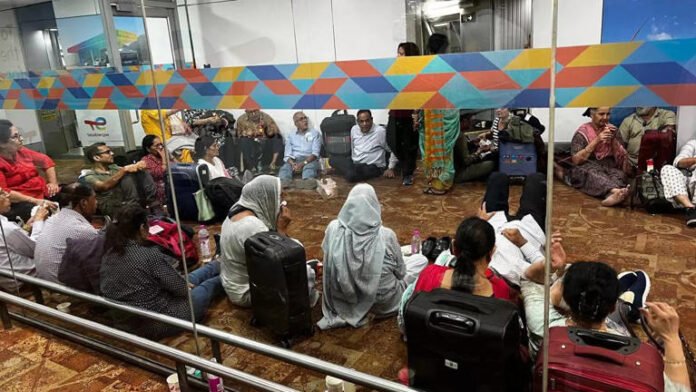Passengers of Air India Flight AI101 from Delhi to New York were left stranded and frustrated after experiencing a staggering 30-hour delay, prompting the airline to issue a formal apology and compensation in the form of a USD 350 voucher. The incident, which occurred at Indira Gandhi International Airport in Delhi, highlights the challenges faced by airlines in managing unforeseen disruptions and the importance of effective communication and customer service in such situations.
The flight delay, which was attributed to technical issues with the aircraft, left passengers stranded at the airport for an extended period, leading to inconvenience and discomfort. Many travelers took to social media to express their frustration and disappointment with the handling of the situation, citing lack of information and communication from the airline.
In response to the outcry from passengers, Air India issued a formal apology and offered compensation in the form of a USD 350 voucher, which can be redeemed for future travel with the airline. The gesture was aimed at acknowledging the inconvenience caused to passengers and providing a token of goodwill in recognition of their patience and understanding during the ordeal.
The incident underscores the importance of effective communication and customer service in managing flight delays and disruptions. While unforeseen technical issues can occur, airlines have a responsibility to keep passengers informed and updated about the status of their flights and provide assistance and support to minimize inconvenience.
In addition to issuing an apology and compensation, Air India also took steps to address the immediate needs of passengers, including providing accommodation and meals during the extended delay. The airline deployed additional staff to assist passengers and ensure that their needs were met while they awaited the resumption of their journey.
The incident also highlights the broader challenges faced by airlines in managing operations amid the ongoing COVID-19 pandemic, which has disrupted global travel and placed additional strain on airlines’ resources and infrastructure. With fluctuating passenger demand, changing travel restrictions, and health and safety protocols in place, airlines must navigate a complex and evolving landscape to ensure the smooth operation of their flights.
Moving forward, Air India has pledged to review its procedures and protocols for managing flight delays and disruptions to ensure that similar incidents are handled more effectively in the future. The airline is committed to upholding the highest standards of customer service and ensuring that passengers are treated with dignity and respect, even in challenging circumstances.
The incident has also sparked discussions about passenger rights and the need for stronger regulations to protect travelers in the event of flight delays and cancellations. While airlines are required to compensate passengers for delays and disruptions under certain circumstances, critics argue that existing regulations may not go far enough in ensuring adequate protection for travelers.
In response to these concerns, aviation authorities and consumer advocacy groups have called for greater transparency and accountability from airlines and stronger enforcement of passenger rights. They have also urged airlines to invest in technology and infrastructure to improve the reliability and efficiency of their operations and minimize the risk of delays and disruptions.
In addition, the 30-hour flight delay experienced by passengers of Air India Flight AI101 highlights the challenges faced by airlines in managing unforeseen disruptions and the importance of effective communication and customer service in such situations. While the incident was undoubtedly frustrating for passengers, the airline’s prompt apology and compensation gesture demonstrate a commitment to addressing passengers’ concerns and improving the overall travel experience. Moving forward, stakeholders must work together to ensure that passengers are adequately protected and supported in the event of flight delays and disruptions, and that airlines uphold the highest standards of customer service and accountability.

